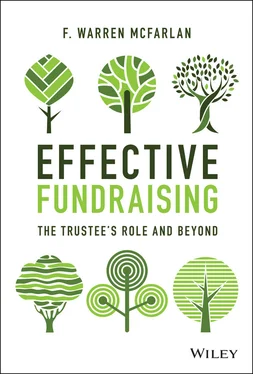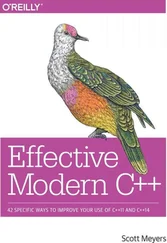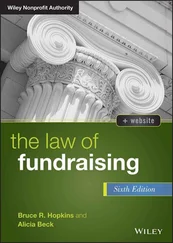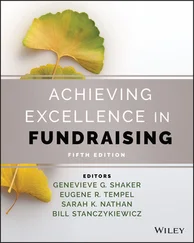This book is based on three propositions. The first is that most people do not like asking other people for money. (There are fortunately exceptions that are real treasures.) They feel solicitation somehow transforms them into beggars, which they find demeaning. They also worry about being seen as abusing relationships as well as being subjected to requests from the prospective donors for future requests to support their charities. The second proposition is that the most effective advocates for an institution are its supporters. Accordingly, every trustee must give according to their means and in so doing be motivated to fully internalize the mission of the organization and become passionate about it. An inner passion and commitment to its mission, appropriately harnessed, transforms them into very powerful sales agents. They have already voted with their time and treasure, giving instant credibility to the listener to their pitch. Often, the most powerful part of a donor ask presentation is the moment when the solicitor describes how and why they have personally supported the organization. Third, there are things that can be done to relatively easily transform someone from being reluctant to making the ask into someone who, as a sales advocate, can effectively and enthusiastically make an ask. Over time, they can move from easy things, like hosting events to making annual fund asks, capital campaign asks, or even becoming a campaign chair. We simply have to change their mindset for this task.
Different Organizations and Their Needs
Solicitation is of enormous importance to most social enterprises regardless of size and type. The parish church or temple, for example, lives almost completely on members' donations. It is not unusual for 90% of all funds for the year to come from an annual stewardship campaign. Additionally, the funds for special projects for the church, like an elevator acquisition or rebuilding of a bell tower, come from capital campaigns rooted in members' philanthropy. Members must ask other members to make this happen.
In a different vein are schools and universities that have operational cash flow streams such as student tuition, sports contest admission fees, art museum and theatre admission fees, and so forth. These streams are normally inadequate to cover all operating expenses. Large schools and universities (like Exeter and Harvard, for example), therefore, often have large endowments (the result of philanthropy of previous generations) plus large development departments to raise current funds. Endowment income plus annual gifts are how these institutional budgets are balanced. Additionally, these institutions have very active planned-giving programs, which extend the reach of the institution plus periodic multibillion-dollar capital campaigns. Survival of the institution often depends on growing these sources of funds. Alumni and trustees, of course, are critical to the effective making of asks bolstered by both the institution leadership and their development professionals. The lay solicitors who believe deeply in the organization's mission, however, add a special credibility to the fundraising effort.
Similarly, institutions like Boston's Museum of Fine Arts have both annual fund campaigns and capital campaigns. In addition, however, they also have potential donors of individual pieces or collections of art who must be courted. Someone who has given objects to a museum has a credibility that few administrators can have. A final example, nonprofit hospitals depend on capital campaigns for new facilities and research funds. Grateful patients make very useful trustees and are invaluable for making the ask.
Some social enterprises are prosperous, like well-endowed schools, whereas others, like small house museums, already cash strapped, are currently seeing philanthropy dropping at a 7% rate per year because of the difficulty in developing a persuasive sales pitch in this new charitable unfriendly tax world. For some institutions, this funding shortfall is so severe that it means bankruptcy or forced merger. For example, all across New England, small colleges and museums have been closing or merging over the past decade, driven by cash flow shortfalls both in the face of new tax laws and being out of favor with the donors as a charity of choice.
The same consolidation has been going on in the nonprofit hospital sector for the past 30 years. Overlay a map of the hospitals in New England 30 years ago on a map of today's hospitals and one sees a war zone with massive casualties and few survivors. Philanthropic success can literally ensure survival in one's current form or be a key to major transformation or strategic alliance. The ask, in short, is a vital function, and people must be willing to be trained to do it. A social enterprise board needs many skills to exercise its responsibilities effectively. Fundraising skills of its members as givers, connectors, and askers, however, often are critical ones. Consequently, the timeworn phrase GGG (give, get, or get off) is still operative for the board members of many social enterprises. Both givers and connecters at the very top of an organization are essential to the health and survival of many social enterprises. The author was recently accused wryly of being a shameless proponent and advocate of stewardship at the top. It is a sin he will readily confess to.
How to get started as a new trustee or solicitor in your philanthropic activities? The first thing a new social enterprise trustee or solicitor who is beginning on the path of philanthropic engagement must do is to take the time to truly internalize the mission of the organization in all its nuances. Until you can accurately and passionately describe its mission, you cannot sell it. In my previous book, Joining a Nonprofit Board: What You Need to Know, 2 the entire book was devoted to mission and the boards' role in developing and executing it. The second thing that the trustee and donor must do commensurate with one's personal resources is to aggressively support the organization (translation: write a personal check large enough that it hurts). Nothing gives you more credibility in selling an organization's mission and needs to future donors than the fact that you are personally supporting it in a meaningful way. When you are talking about your gift and how you thought about it, you add a priceless note of authenticity to your pitch. A neighbor of the author, when taking over her church's annual stewardship campaign, looked carefully at her previous years' donations and made a stretch gift from her perspective. In the ensuing months, the making of this gift gave an underlying passion to her presentations (both public and one-on-one) which rang with the authenticity of the true believer. This passion was critical to the campaign's ultimate success. Enthusiasm and passion are vital tools in the fundraising tool kit. A good fundraiser has many of the attributes of an evangelist.
A recent leader of a hospital's capital campaign shows the importance of donor longitudinal engagement. Twenty years ago, the individual had been chair of the hospital's board. After serving his term and making a significant seven-digit-figure gift to the hospital's first capital campaign, he had remained involved with the hospital as a corporator and then as its liaison to another medical organization. He also continued being a patient of the hospital, using many of its doctors over the years. As a fundraiser, the 20-plus years of experience and involvement with the hospital underscored his deep commitment, which came through in the various solicitation calls and visits he made for the current campaign (including his self-solicitation) to which, as a campaign co-chair, he had first pledged generously.
What the preceding example shows is that a trustee's fundraising skills can be valuable to an organization long after the trustee's term has expired. Former trustees properly engaged are real assets as solicitors in campaigns ranging from those of bricks and mortar to planned giving. Preparation for this role begins when one first becomes engaged as a solicitor and is then successively nurtured and deepened over the years of one's service in many ways. When you recruit trustees, you are engaging their services for the organization not just for their terms as a trustee but also for a very long period of time during which the individual will pass through many roles with the organization beyond that of trustee. Their historical memory of past donors and prior campaign issues, plus their deep commitment, provides invaluable context for today's and tomorrow's campaigns.
Читать дальше












